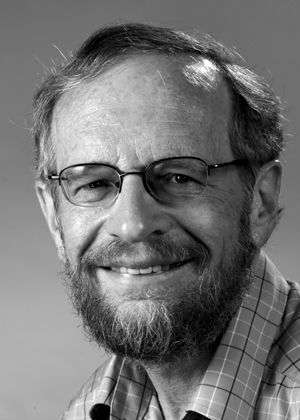Citation

Richard Alley, Evan Pugh Professor of Geosciences, Pennsylvania State University, is a global leader with a phenomenal record of accomplishments in science communication. He is lead author of the Intergovernmental Panel on Climate Change Working Group I report The Physical Science Basis (2007) and has also authored public and general education books, including Two-Mile Time Machine: Ice Cores, Abrupt Climate Change and Our Future, and Earth: The Operators’ Manual. Publishers Weekly referred to Time Machine as a “brilliant combination of scientific thriller, memoir and environmental science” and recognized Earth: The Operators’ Manual as a book that “thoroughly explains the dynamics of global warming” with a “lively and positive” approach. He is also author and coauthor of numerous interpretation and overview articles in Science, Nature, Scientific American, Proceedings of the National Academy of Sciences of the United States of America, and education journals and supplements.
Richard has also made more than 800 nontechnical presentations to interest groups, the public, industry, and museums and has responded to an estimated 4000 media inquiries and taught a global online course on climate science. In addition, he advised the U.S. president’s science office, the U.S. vice president, the U.S. Senate, and congressional committees and senators and provided advice and briefings to many levels of government.
He provided text to the National Science Foundation that was incorporated into a speech by the president of the United States. And he is the author of 335 publications, including 241 in peer-reviewed scientific journals!
Tom Wagner of NASA characterized Richard Alley as an “exceptional researcher…an outstanding communicator…a central figure in policy discourse…. His audiences at scientific meetings typically overflow the room, and he is enviably comfortable speaking to eight-year-olds.” He has traversed the continent to share the climate message with audiences, often riding those red-eye flights to make tomorrow’s lecture and then share a science discussion in a local school. Search YouTube for “Richard Alley scientist,” and thousands of videos that feature Richard’s congressional testimonies, public and science presentations, and humorous science music videos appear; his presence goes on and on. In the YouTube video “How to talk to an OSTRICH: ‘IT’S US,’” Richard makes carbon balance and isotope geology interesting and enjoyable to everyone.
Richard speaks to all audiences, sharing science, impacts, and wonderful discussions of solutions. He leaves people with greater understanding and confidence that we can address the biggest challenges of our time. How does he do all these things so well and remain our kind, humble, and generous colleague? I cannot imagine anyone more deserving of this AGU Climate Communication Prize.
—James M. Byrne, University of Lethbridge, Lethbridge, Alb., Canada
Response
This honor is deeply humbling. My thanks to Jim Byrne, himself a brilliant climate communicator, to so many colleagues, and to AGU. I have had the opportunity to work with and learn from the best, and I thank them, especially Geoff Haines-Stiles. Thanks to Kerry Emanuel. Particular thanks to my wife, Cindy, and daughters, Janet and Karen, a wonderful family who all are outstanding science communicators who helped my efforts.
Climate communication is almost always painted as doom and gloom. But, ultimately, our field empowers, using knowledge to make people better off.
Suppose we were forced to summarize the entire Intergovernmental Panel on Climate Change output as a sound bite. That’s impossible, but a scholarly attempt might be, in passive voice, “There is a significant social cost of carbon.” Humanity gains good from the energy released by burning fossil fuels, and the price reflects that good, but the carbon dioxide released causes net harm that is not in the price. We could rephrase that as “Society subsidizes fossil fuels.” But we could also say, “The economy and the environment will be better off if society uses our knowledge of energy and climate wisely.”
I believe all of us understand that living for today and planning for tomorrow involve trade-offs. But even if we calculate with a typical economic “pure rate of time preference,” essentially assuming we are more important than our grandchildren, ignoring climate science is still economically inefficient. In some sense, the social cost of carbon is profit waiting to be made, profit we will throw away if we reject science.
People have a history of burning through energy sources far faster than nature makes more, suffering shortages, and then finding something else to burn. We did it with trees, and whales. Now we’re doing it with fossil fuels, burning in a few hundred years what took nature a few hundred million years to accumulate. But we are the first generation that truly knows how to build a sustainable energy system. Delaying that transition will lead to damaging climate changes that persist for millennia and beyond; making the transition smoothly may be one of the greatest material accomplishments of humanity.
Our knowledge on climate and energy, used wisely, really can bring more good to more people. Climate communicators have an unfinished, central role to play in helping people see the good, and to reach it. I thank you for including me in the effort.
—Richard B. Alley, Department of Geosciences, and Earth and Environmental Systems Institute, Pennsylvania State University, University Park
Citation:
(2017), Richard B. Alley receives 2016 Climate Communication Prize, Eos, 98, https://doi.org/10.1029/2017EO064555. Published on 24 January 2017.
Text © 2017. The authors. CC BY-NC-ND 3.0
Except where otherwise noted, images are subject to copyright. Any reuse without express permission from the copyright owner is prohibited.
